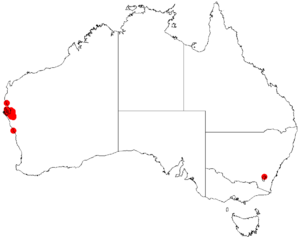Acacia drepanophylla facts for kids
Quick facts for kids Acacia drepanophylla |
|
|---|---|
| Conservation status | |
| Scientific classification |
|
| Kingdom: | Plantae |
| Clade: | Tracheophytes |
| Clade: | Angiosperms |
| Clade: | Eudicots |
| Clade: | Rosids |
| Order: | Fabales |
| Family: | Fabaceae |
| Clade: | Mimosoideae |
| Genus: | Acacia |
| Species: |
A. drepanophylla
|
| Binomial name | |
| Acacia drepanophylla Maslin
|
|
 |
|
| Occurrence data from AVH | |
| Script error: The function "autoWithCaption" does not exist. | |
Script error: No such module "Check for conflicting parameters".
Acacia drepanophylla is a type of tree that belongs to the Acacia family, also known as wattles. It is found only in Western Australia, meaning it is endemic to that area.
What it Looks Like
This tree usually grows to be about 2.5 to 5 meters (8 to 16 feet) tall. It has grey bark that is cracked and stringy, which means it looks like it has many small cracks and fibers.
The Acacia drepanophylla tree often has a shape like an upside-down cone. Its small branches are smooth, and its new shoots are a pale yellow color.
The leaves, called phyllodes, are shaped like a sickle (curved like a hook) and are long and narrow. They are about 9 to 20 centimeters (3.5 to 8 inches) long and 3 to 6 millimeters (0.1 to 0.2 inches) wide. These leaves are smooth and not stiff. They have a delicate, pointed tip and fine lines, with one main line running down the middle.
The flowers are pale yellow and grow in small spikes, about 15 millimeters (0.6 inches) long and 5 millimeters (0.2 inches) wide. These flower spikes usually appear in pairs. The tree blooms from May to July.
After flowering, the tree produces flat, smooth seed pods that are long and narrow. They are slightly squeezed in between each seed. These pods can be up to 11.5 centimeters (4.5 inches) long and 8 to 11 millimeters (0.3 to 0.4 inches) wide. They are firm like paper or slightly leathery. Inside the pods, the seeds are dull grey to brown and shaped like flattened balls, about 5 to 6 millimeters (0.2 inches) across.
How it was Named
This tree was first officially described by a botanist named Bruce Maslin in 1983. He wrote about it in a scientific journal called Nuytsia.
Later, in 2003, another botanist named Leslie Pedley changed its name to Racosperma drepanophyllum. However, in 2006, it was changed back to its original name, Acacia drepanophylla.
This tree is closely related to Acacia oldfieldii, which grows in nearby areas. It is also related to Acacia acuminata, which is found much further south.
Where it Grows
Acacia drepanophylla is found naturally in the Gascoyne region of Western Australia. You can find it around places like Carnarvon and Shark Bay.
It grows on flat plains, gently rolling hills, and small rises. It prefers red, clay-like soils that are often found over limestone rock. Most of these trees grow between Yaringa Station in the north and Wannoo in the south.
This tree is quite common in this area. Sometimes, it even grows so much that it becomes the main type of tree, forming thick groups. It is usually part of plant communities where Acacia trees and shrubs are common.
 | George Robert Carruthers |
 | Patricia Bath |
 | Jan Ernst Matzeliger |
 | Alexander Miles |


